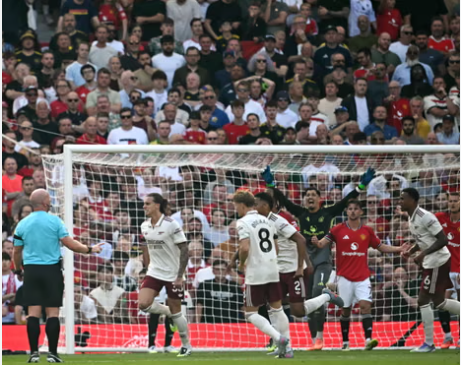 Arsenal’s Riccardo Calafiori (centre left) wheels away to celebrate as Manchester United’s goalkeeper Altay Bayindir appeals to the referee. Photograph: Paul Ellis/AFP/Getty Images
Arsenal’s Riccardo Calafiori (centre left) wheels away to celebrate as Manchester United’s goalkeeper Altay Bayindir appeals to the referee. Photograph: Paul Ellis/AFP/Getty Images
New seasons rarely feel like true clean slates. The sun might have been shining, the air warm in the mid-20s. Fresh kits gleamed on the field, new flags rippled in the stands. Supporters, especially those buzzing from the new fan zone behind the Stretford End, clung to the hope that surely this campaign couldn’t sink as low as the last. Yet football always carries its past with it. The roots of this match stretched back to last December.
Arsenal thrive on set pieces; United remain fragile when defending inswinging crosses. Back in December, Arsenal beat United 2-0 at the Emirates, both goals coming from corners. André Onana was in goal then, but Tottenham had already spotted how uneasy United looked against deliveries curling into the six-yard box, exposing their keeper’s vulnerability.
A fortnight later, Spurs met United in the Carabao Cup. This time, Altay Bayindir started, only to suffer the humiliation of being beaten directly from a Son Heung-min corner.
Inswingers unsettle United—and they torment Bayindir in particular. Declan Rice, of course, strikes a wicked inswinger. So it felt almost preordained what would unfold after 13 minutes. United had shown a flicker of threat, and Arsenal had been rattled into conceding four fouls. Then came a corner from the left.
Rice whipped it in, Bayindir flailed, and had Riccardo Calafiori not nodded home from the line, the goalkeeper might have chalked up an own goal himself.
United might argue that William Saliba, having tangled with Mason Mount, collided with him at the moment the ball was delivered—and under the new emphasis on punishing holding, a foul could have been awarded. Yet there were several other tussles in the area during that same corner, any of which could just as easily have been whistled. In truth, whatever decision the referee made would have felt arbitrary.
At the core, though, stronger goalkeeping would have erased the debate. David Raya demonstrated as much early in the second half, rising decisively to punch clear a Bruno Fernandes inswinger while brushing Matthijs de Ligt aside. That is how it should be done.
Perhaps the metaphor of building from the ground up was always misleading. Perhaps laying solid foundations does not automatically mean constructing a reliable defence.
In today’s game, where football doubles as a content machine, there is arguably commercial sense in investing more heavily in goalscorers and playmakers—the ones whose highlights will trend, the glittering spires atop the roof. But the reality remains: spending £200m on forwards is of little value if you continue to concede soft goals. Especially if those attacking players fail to score at the other end.
 Ruben Amorim could soon find himself under pressure. Photograph: Peter Powell/Reuters
Ruben Amorim could soon find himself under pressure. Photograph: Peter Powell/Reuters
There were positive signs from both Bryan Mbeumo and Matheus Cunha, but the most incisive United player, yet again, was Amad Diallo, who came off the bench to play at right wing-back 10 minutes into the second half. United, perhaps, would consider themselves unfortunate. Patrick Dorgu hit the post, and Raya had to make seven saves, more than any other goalkeeper on the opening weekend. But only his reflex stopped down to his left to keep out a Cunha effort from a narrow angle was a save that he would not necessarily be expected to make.
To point out that United drew this fixture last season and that they’re therefore doing worse this season is, on one level, meaningless.
But equally, this is a manager whose win percentage is 37.2%, the worst in half a century – and if United fail to win at Fulham next week, he will drop below both Frank O’Farrell and Wilf McGuinness to have the worst win percentage of any United manager since Herbert Bamlett, who was sacked in 1931. Context matters.
There was plenty of mitigation on Sunday afternoon. The closer you zoom in, the more excuses can be found: a goalkeeping error, new players settling in, a couple of close-run things. But it won’t take many more bad results for faith in Amorim to wane. When form has been so bad, it’s only natural to catastrophise: if they don’t win at Craven Cottage, the next home match, against newly-promoted Burnley, takes on a ghastly aspect: not merely a game they should win, but a game they have to win.
This campaign cannot be separated from the last. Fresh signings and renewed optimism cannot erase the footprints of past failings. Bad results don’t just count against you in the present; they cast shadows forward. The past and present are always waiting in the future.